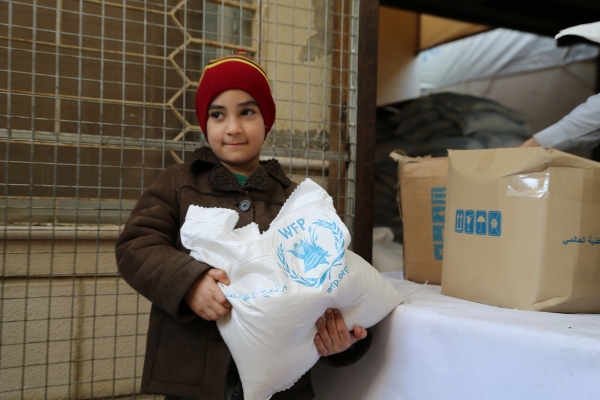Syria Conflict Enters Fourth Year As Some Food Reaches Previously Inaccessible Areas

Over the last few days, WFP reached Al-Houle in rural Homs for the first time since May 2013 and delivered food for 20,000 people. Trucks carrying food rations for another 20,000 people arrived in Ar-Raqqa Governorate for the first time in six months.
Locally-negotiated ceasefires allowed convoys into areas of Rural Damascus and rural Dara’a. Five WFP trucks delivered food for 17,500 people in camps for displaced people north of Idlib. Among the camps were some that had not been reached directly by WFP since the start of the conflict in 2011.
However, worsening security is creating setbacks in some areas, such as the Northeast governorate of Deir-Ezzor. Although an inter-agency convoy delivered food and other humanitarian supplies to 27,000 people there last month, a sudden deterioration in security on the roads leading to Deir-Ezzor is preventing the dispatch of more food in March.
“One-off convoys into besieged areas can provide temporary relief, but WFP still needs proper and sustained access to people to provide life-saving assistance and also to assess the scale of the needs,” said Amir Abdulla, WFP’s Deputy Executive Director and Chief Operating Officer, in Geneva.
In February, WFP assisted 3.7 million people in Syria and more than 1.5 million refugees in neighbouring countries. The UN food agency aims to reach as many as 4.25 million people inside Syria every month, but insecurity is leaving half a million people without food assistance.
The operations are financed entirely by voluntary contributions, and funding is also a challenge, said Abdulla.
“It would be tragic to secure more access in Syria but to then find ourselves in a situation where we do not have the required funds to assist hungry people who have long been under siege. We certainly hope that donors will step up their contributions and new ones will come forward,” said Muhannad Hadi, WFP Regional Coordinator for the Syria crisis, in Amman.
A lack of timely funding has forced WFP to reduce the size of this month’s food basket for vulnerable families inside Syria by 20 percent. As a result, families are receiving fewer nutrients than they require to stay healthy (1,530 kilocalories, compared to the planned 1,920 kilocalories.)
This year, WFP has appealed for US$2 billion to feed around 7 million Syrians displaced in their country or who have fled to neighbouring countries. WFP needs US$309 million to cover the food needs of vulnerable Syrians until the end of May.
“We are grateful to the generosity of our donors, whose contributions have enabled us to save lives, but our emergency operation is running hand-to-mouth and our funding has now reached dangerous levels,” said Hadi.
Delays in funding have an impact on operations, as it takes close to three months from the moment WFP purchases food until it arrives in Syria and is dispatched for distribution.
Funding is also essential for WFP operations in neighbouring countries, where over 1.5 million Syrian refugees depend on the UN food agency’s food vouchers. WFP often uses vouchers to provide assistance where markets are functioning but people cannot afford to buy food. Vouchers provide people with more choice; they can buy fresh foods such as fruit, vegetables and milk that are not normally included in conventional food rations.
In 2013, through the voucher programme, WFP injected over US$400 million into the local economies of neighbouring countries. WFP plans to expand its voucher assistance to reach over 2.9 million Syrian refugees this year.
Package of photo material available here: https://www.yousendit.com/download/elNMV0o4TkxFd2REZU1UQw
For new video material in coming days, contact Jonathan Dumont: jonathan.dumont@wfp.org.
# # #
WFP is the world’s largest humanitarian agency fighting hunger worldwide. On average, WFP reaches more than 90 million people with food assistance in 80 countries each year.
Follow us on Twitter @wfp_media and @wfp_mena
For more information please contact (email address: firstname.lastname@wfp.org):
Abeer Etefa, WFP/Damascus, Mob. +20 1066634352. Tel. +202 2528 1730 ext. 2600
Dina El Kassaby, WFP/Damascus, Mob. +963 958 882 303 or +962 7 9867 4638
Laure Chadraoui, WFP/Beirut-Amman, Mob. +962795915230 and +9613489925
Elisabeth Byrs, WFP/Geneva, Tel. +41 22 9178564, Mob. +41 79 4734570
Gregory Barrow, WFP/London, Tel. +44 207 2409001, Mob. +44 796 8008474
Emilia Casella, WFP/Rome, Tel. +39 06 65133854, Mob. +39 347 945 0634
Bettina Luescher, WFP/New York, Tel. +1 646 5566909, Mob. +1 646 8241112
